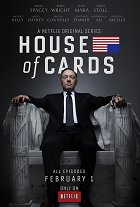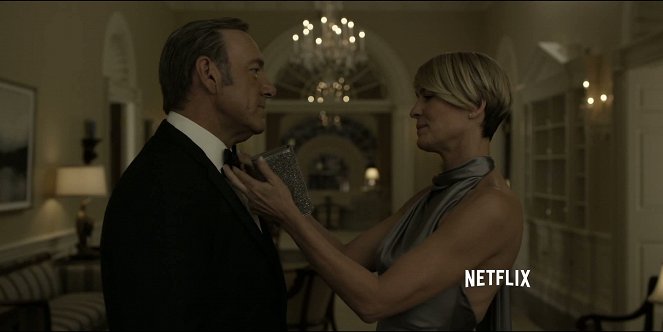Creators:
Beau WillimonComposer:
Jeff BealCast:
Kevin Spacey, Robin Wright, Michael Kelly, Rachel Brosnahan, Mahershala Ali, Nathan Darrow, Michel Gill, Reg E. Cathey, Sebastian Arcelus, Kate Mara (more)VOD (2)
Seasons(6) / Episodes(73)
Plots(1)
A Congressman works with his equally conniving wife to exact revenge on the people who betrayed him. (official distributor synopsis)
Videos (25)
Reviews (8)
Kevin Spacey back in form. Even though his character is rotten through and through, he has such charisma that it doesn't matter in the end. But the others, like his wife Robin Wright and especially the manipulated congressman Corey Stoll, are no less worthy competitors. The start was great, so we can only wait for the next season of politics without gloves. The next season adds to the pace and benefits from being much tighter, you enjoy Underwood the most, and it doesn't even give you as much reason to hate him by his standards. But that just brings me to the third and final season so far. Surprisingly, the plot is again disjointed. We follow the fates of several characters whose decisions sometimes teeter on the edge of what the viewer can bear. It's "rough" entertainment, but I can't shake the impression that it's just a drawn-out prelude to the last stage of Frank's politics....Unfortunately, the last stage hasn't arrived even after 5 seasons. Thanks to Spacey, but mostly because of Netflix's haste, we now have the least dignified ending to a series I can remember. That’s America for you.
()
A masterclass of Machiavellianism where, if we looked closely, we would surely find the vast majority of freeloaders in our illustrious parliament. And it doesn't matter if you are a democrat or a republican, a socialist or an atheist, you will all end up soaking in the filth of power. So finally we have a series that doesn't rely on would-be shocking twists or tired cliffhangers at the end of each episode to make the excited viewer want to come to the screen next time. On the contrary, there's a very sophisticated script that chills at times and where Kevin Spacey literally relishes being a political swine, even with his unusual on-camera monologues. Don’t let the weaker start discourage you, the best comes with the later episodes and it all builds up fantastically towards the end. So, now with the second season. It’s even better. The creators cut the subplots to a minimum, reduced the number of Underwood's adversaries, and let him face a single strong one, which benefited the series. The final episodes are emotional carnage, the last shot is a masterpiece, and I hereby officially declare Frank Underwood the greatest human scum in the history of TV.
()
Ruthless pragmatism. Blackmail, corruption, (un)feigned (a)morality, ambition and desire for power with an American smile of their lips, dressed up in high-level politics. Do you know that feeling when torn between wanting to watch another episode right now, and not wanting to watch it, because you would be stealing a whole episode from yourself, bringing you inexorably nearer to the end where no further episodes await? Know it? That’s exactly where this American remake of House of Cards has gotten me. It’s a remake that makes sense, because although both versions start out from a similar point, subsequently they go their own way. The American version builds on the pragmatic dynamism of the Underwoods’ relationship and is (un)surprisingly much closer to The Ides of March than to the original book (which is no coincidence, thanks to Willimon). This is a loquacious series of political intrigue where the phrase “crapping on" seemingly applies perfectly. Seemingly. But in fact, it would be hard to find a series where such tangible venom is bubbling away under the surface. And the stark, cold appearance of Fincher’s work suits this almost unexpectedly well; and that also applies to the episodes that this director didn’t work on. In later seasons, the creators gradually worked in more and more topical issues into the series. Which (for the time being) climaxes in season three with AmWorks and “would-be Putin"; and surprisingly it isn’t at all damaging or cumbersome and it doesn’t seem like “compulsory filler because we don’t know what else to fill each season’s thirteen episodes with", but at the same time it can’t be denied that season three has a completely different atmosphere (not just) due to this, and this isn’t always good. Although season four doesn’t start off too well in the first two to three episodes, but then suddenly it turns into the second best season of all, despite being a little far-fetched. It has also been freed of previous ballast and so is more dynamic; which is also evident in the shortened episode length (about 8 mins per episode, meaning overall about 2 episodes shorter). The series certainly isn’t flawless (but what is; what matters here is mainly the product placement and the rather loose second season that lacks the “humanizing" element à la Peter Russo), it just seems to be most of the time; especially seasons one and four. | S1: 5/5 | S2: 4/5 | S3: 4/5 | S4: 5/5 |
()
I consider myself a rational person who also dislikes rushing, so I let myself be controlled by emotions only exceptionally - usually when something heavy or sharp falls on my foot. I reject love at first sight, yet after just a few minutes of the first episode, I felt a strong connection between me and the series forming - it simply perfectly hit my mood and my taste. Satire is counted among comedic genres, usually associated with exaggeration and absurdity, with grotesque and black humor. We expect bursts of laughter from it. At one point in the past, I was surprised that the morbid novel "The Child Buyer," which evoked completely different emotions in me, is also referred to as satire by reviewers. Under the label of political satire, we probably imagine series like Yes, Minister, or the more outspoken The Thick of It. House of Cards appears more serious at first glance, focusing on credibility and not attempting to evoke bursts of laughter. It initially follows the formula of social dramas. An ambitious man who has tied his future to a presidential candidate expects a substantial reward after winning the elections. However, the feast for the privileged is forbidden to him, with the condition that he must have supervision over the cafeteria, which undeniably has quality and no one is hungry there. However, the cafeteria food cannot satisfy Francis's appetite for power, so as an experienced chef, he begins to mix ingredients in a way that would upset the head chef and cause a stir in the kitchen. Francis is a perfect power technologist, a manipulator, and a skillful negotiator, who is knowledgeable about human psychology and the functioning of state institutions. Francis's detachment, ironic glosses, and comments that he directs at the viewer reveal that we are truly in the realm of satire, despite the objectivity and the effort to have an analytical view. House of Cards paints an unflattering picture of American high politics manipulated by lobbyists, disintegrated by personal ambitions and intrigues. Noble ideals here too often succumb to cynical pragmatism and manipulation. The charm of the series lies in the virtuosity with which Francis goes through the story and directs the course of events. Even the best ancient orators would have to pay tribute for his performance in the church, where he masterfully managed to break the spikes of hatred and gain the sympathy of those present. ------ Whether I like it or not, I have to return to my review after some time. Making mistakes is human, and I repentantly confess to my mistake. Some series quickly lose steam, the screenwriter runs out of ideas, or the story falls flat. Here, I get the feeling that the screenwriter and I completely diverged at some point. I wanted to see something in House of Cards that it is objectively not and does not want to be. The sexual affair between Frank and the ambitious young journalist should have warned me because honestly, it did not fit his character and ambitions at all. Frank would not just throw himself at someone who can offer him so little. However, the real blow came with the first murder. Innocents, of course, do not move in high politics, but for several centuries, it has been customary that the dirty work is entrusted to someone who can be removed or thrown overboard if necessary. Ideally, someone whom it is difficult to connect to the client. Here, Frank comes across more as an unpredictable psychopath than a big player. After the second murder, I definitively gave up on the series. The cast is great, but what the screenwriter is doing kills the promising potential. Overall impression: from the originally lofty heights, I have fallen very deeply in the second season, so my overall impression of 60% is a compromise in its own way - also with the knowledge that I would go down by a few percentage points with each subsequent episode.
()
(less)
(more)
Money. Power. Power and money. And politics is a means of getting both of them. Fincher spot on as always, Spacey again enjoys his role marvelously. So far I see this very optimistically. Season one: Naively I thought that this would be more encapsulated, but that would be wanting too much. Fincher set the tone, Schumacher moves on in a similar vein, but all those involved in the direction are doing an excellent job. In this beautiful to exemplary insight into the game of high-level politics. You are on Spacey’s side, Kate Mara at last shows her true colors of a little careerist bitch. What is missing when you compare it with The Boss is urgency and greater sympathy with the characters, as if the high-level politics was too perfect and cleansed. This isn’t downright bad, I just want to explain why I prefer the other series (even though it was certainly lower budget and less bombastic). This doesn’t mean that we won’t meet up with Frank Underwood again next season. Quite the opposite, I look forward to him tapping me on the shoulder again and taking me through that rotten place that goes by the name of the Whitehouse. Season two: A much better-knit game than the last, slowly-dosed season. But Frank is aiming high and he needs a larger screen for his masterpiece. The details undermining his mastery slightly bother me, but the last episode assuages my fears. America is in the right hands. Good things happen to good people. Season three: Political intrigue trampled by the relationship storyline. It is the dynamics of the first couple and mainly of Claire, played perfectly by Robin Wright, that drives this year’s campaign forward. Thanks to the Russians, foreign policy is heavy-duty and, along with probing the Underwood’s marriage, it exceeds all expectations. The ending is brutally open-ended. Season four draws on the very best historical events and decisions by the United States. Things aren’t easy for Frank and Claire, but they manage to pull an ace out of their sleeve when they are waist-deep in quick sand. The finale is brilliant, even though I’m sure that lots of nitpickers will be talking about a departure from reality, but they should brush up on some not so distant history. Barack is no longer a fan. And Donald is becoming one.
()
Gallery (796)
Photo © Netflix



Ads